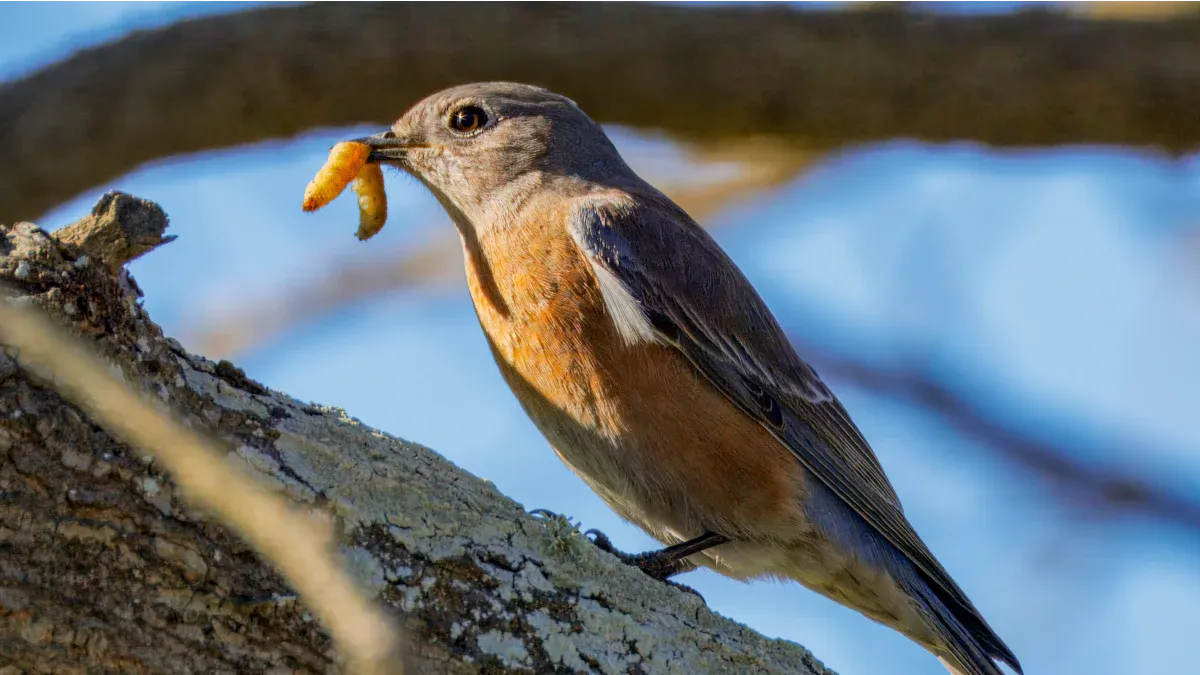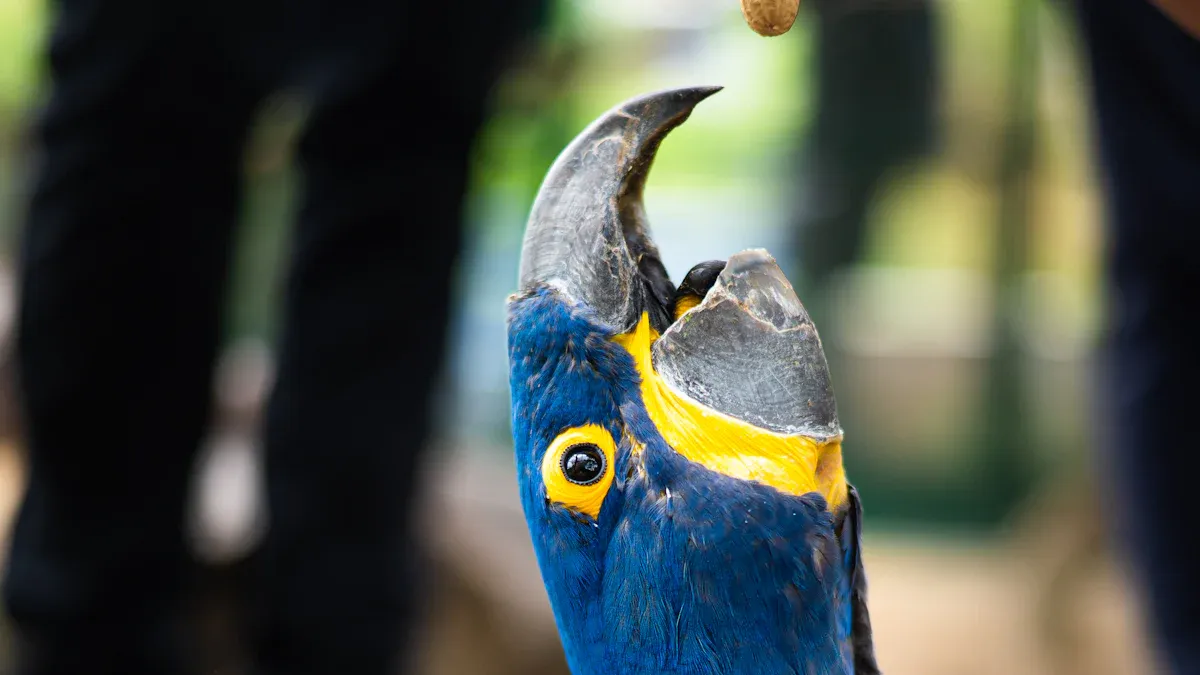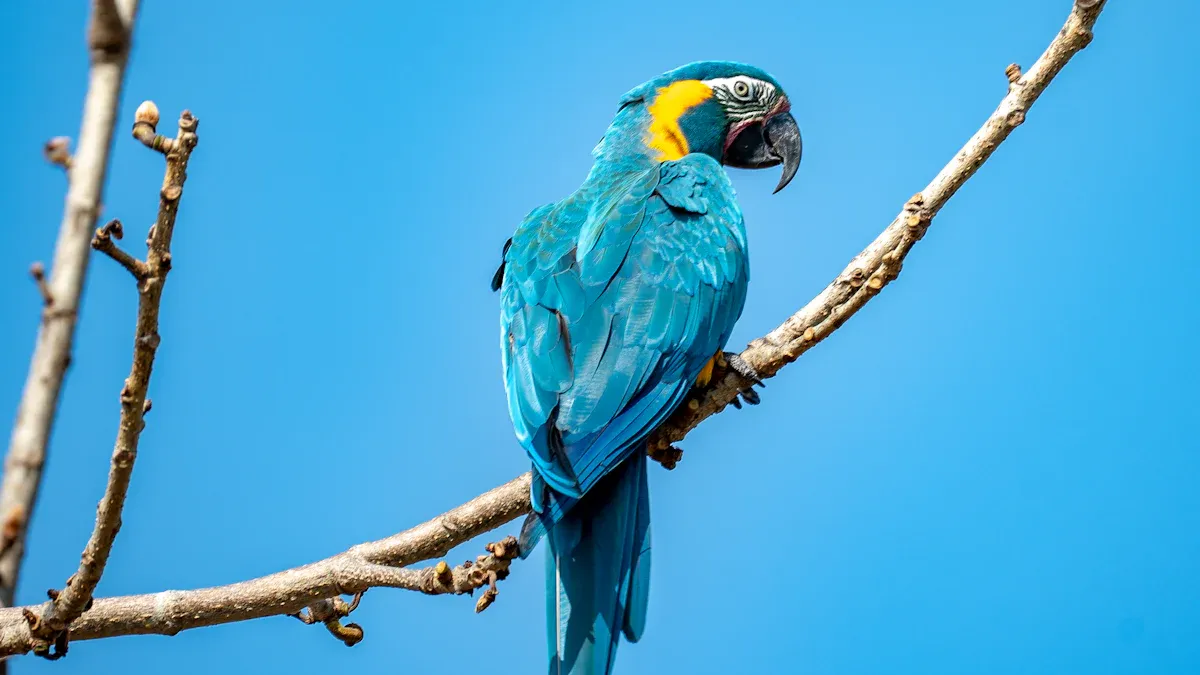
Parrots eat mealworms because these insects offer a rich source of protein and nutrients. They help boost energy and support feather health. Mealworms also strengthen the immune system. Many parrots enjoy mealworms as a natural treat. Adding mealworms to their diet can improve overall well-being.
Key Takeaways
- Mealworms provide parrots with high-quality protein, healthy fats, and essential vitamins that support energy, feather health, and immune strength.
- Offering mealworms mimics a parrot’s natural diet and encourages healthy foraging behavior, making them a tasty and beneficial treat.
- Feed mealworms in moderation as part of a balanced diet, choosing safe sources and watching your parrot’s response to keep them healthy and happy.
Why Parrots Eat Mealworms in Nature

Wild Parrots and Insect Consumption
Wild parrots live in diverse habitats, such as rainforests, woodlands, and savannas. These birds search for food every day. They eat seeds, fruits, nuts, and sometimes insects. Insects provide important nutrients that help parrots stay healthy. Many wild parrots eat insects like beetles, caterpillars, and larvae. Mealworms are a type of larvae that parrots find in decaying wood or under leaves.
Scientists have observed wild parrots picking through bark and soil to find insects. This behavior shows that insects are a natural part of their diet.
Eating insects helps parrots get protein and energy. It also supports their growth and feather health. Parrots eat mealworms in the wild when they need extra nutrition, especially during breeding or molting seasons.
Mealworms as a Natural Food Source
Mealworms offer a rich source of protein and healthy fats. These nutrients help parrots build strong muscles and shiny feathers. In the wild, mealworms are easy for parrots to find. They live in moist, dark places where parrots often search for food.
Parrots eat mealworms because these insects taste good and provide quick energy. Mealworms also contain vitamins and minerals that support a parrot’s immune system. Many bird experts recommend mealworms as a natural treat for pet parrots.
- Mealworms mimic the wild diet of parrots.
- They help parrots stay active and healthy.
- Parrots enjoy the taste and texture of mealworms.
Nutritional Benefits When Parrots Eat Mealworms

Complete Protein and Amino Acids
Protein plays a vital role in a parrot’s diet. It helps build muscles, repair tissues, and support feather growth. Parrots eat mealworms because these insects provide a complete protein source. Mealworms contain all the essential amino acids that parrots need for healthy development. Compared to other foods, mealworms offer a higher protein content, especially when dried.
| Food Item | Protein Content (Dry Weight Basis) |
|---|---|
| Dried Mealworms | Approximately 53% |
| Mealworms (dry) | Between 70% and 76% |
| Soybean Meal | 44% |
Mealworms stand out as a superior protein source. Their high protein levels support energy, feather health, and immune function. Many bird owners choose mealworms to help their parrots thrive, especially during times of growth or molting.
Healthy Fats, Fiber, and Energy
Mealworms supply healthy fats that give parrots energy for daily activities. These fats also help keep a parrot’s skin and feathers shiny and strong. The fat content in mealworms supports overall health and helps parrots stay active. Here are some benefits of the fats found in mealworms:
- Provide energy for flying, climbing, and playing
- Support shiny, healthy feathers and skin
- Help parrots maintain a healthy weight when fed in moderation
Mealworms also contain dietary fiber. Fiber aids digestion and helps parrots feel full and satisfied. Parrots eat mealworms not only for protein but also for the energy and healthy fats they provide.
Tip: Offer mealworms as a treat or supplement to a balanced diet. This helps parrots get the energy and nutrients they need without overfeeding.
Essential Vitamins and Minerals
Mealworms offer important vitamins and minerals that support a parrot’s health. Scientific studies show that mealworms contain vitamin E and B-vitamins, which help with energy production and immune support. They also provide some β-carotene, a nutrient that the body can turn into vitamin A. However, mealworms have lower levels of calcium and vitamin D compared to fruits and vegetables.
Fruits and vegetables in a parrot’s diet supply vitamin C and calcium, while mealworms add fat-soluble vitamins and B-vitamins. These foods work together to give parrots a complete range of nutrients. By combining mealworms with fruits and vegetables, owners can help their parrots get all the vitamins and minerals they need.
Many bird experts recommend mealworms as part of a varied diet. Parrots eat mealworms in the wild and benefit from the nutrients they provide. When offered alongside other healthy foods, mealworms help parrots stay strong, energetic, and healthy.
Scientific Evidence and Safe Feeding of Mealworms
Research on Parrots Eating Mealworms
Scientists have studied how mealworms affect parrot health. Research shows that mealworms provide high-quality protein and important nutrients. Parrots eat mealworms in the wild and in captivity. Studies report that parrots who eat mealworms show better feather quality and higher energy levels. Many veterinarians recommend mealworms as a supplement, especially during molting or breeding seasons.
Safe Ways to Offer Mealworms
Owners should always choose mealworms from trusted sources. Suppliers must follow humane practices and maintain strict quality control. This ensures the safety of both the mealworms and the parrots. Environmentally friendly mealworm farms use sustainable methods. These farms help protect natural habitats and reduce harm to the ecosystem. When selecting mealworms, buyers should look for products that support ethical treatment and environmental sustainability.
Tip: Always wash hands before and after handling mealworms to keep both birds and people safe.
Live vs. Dried Mealworms and Feeding Guidelines
Parrots can eat both live and dried mealworms. Live mealworms encourage natural foraging behavior. Dried mealworms are easy to store and serve. Owners should rehydrate dried mealworms before feeding. Mealworms should be a treat, not a main food. A balanced diet includes fruits, vegetables, seeds, and nuts.
- Start with a small amount of mealworms.
- Watch the parrot’s reaction.
- Adjust the portion as needed.
Parrots eat mealworms for extra protein and energy. Offering mealworms in moderation helps keep parrots healthy and happy.
Parrots eat mealworms because these insects offer natural nutrition and mimic wild feeding habits. Scientific studies show benefits for feather health and energy. Owners should consult a veterinarian for the right portion size. Mealworms work best as part of a balanced diet, not as the only food.
FAQ
Can all parrots eat mealworms?
Most parrots can eat mealworms. Owners should introduce mealworms slowly and watch for any signs of allergies or digestive issues.
How often should parrots eat mealworms?
Parrots should eat mealworms as a treat, not daily. Two to three times per week works well for most parrots.
Are dried mealworms as healthy as live mealworms?
Dried mealworms provide similar nutrients as live ones. Owners should rehydrate dried mealworms before feeding to help parrots digest them easily.


